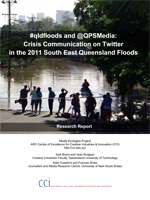Canberra.
The next panellist at the DHA 2012 ‘Big Digital Humanities’ plenary is Harold Short. He begins by reviewing the different types of digital humanities infrastructure which are now being developed, and notes activities at institutional, national (including the recent Research Data Storage Initiative in Australia), and international levels here. This is a new development – for too long, digital humanities have piggybacked onto existing science infrastructures, but now they are increasingly developing tools to suit their own, specific needs.
At national levels around the world, there are various major initiatives (such as the National Library of Australia’s Trove project …

 Twelve months ago Brisbane, and the South East Queensland region, were just about to begin the long process of recovery from the major floods which affected Toowoomba, the Lockyer Valley, Ipswich, and Brisbane itself. One of the more positive stories to emerge from the crisis, though, was how social media were used as a tool for sharing news and information about the disaster, and for assisting locals with organising the (significantly volunteer-driven) relief and recovery effort.
Twelve months ago Brisbane, and the South East Queensland region, were just about to begin the long process of recovery from the major floods which affected Toowoomba, the Lockyer Valley, Ipswich, and Brisbane itself. One of the more positive stories to emerge from the crisis, though, was how social media were used as a tool for sharing news and information about the disaster, and for assisting locals with organising the (significantly volunteer-driven) relief and recovery effort.










